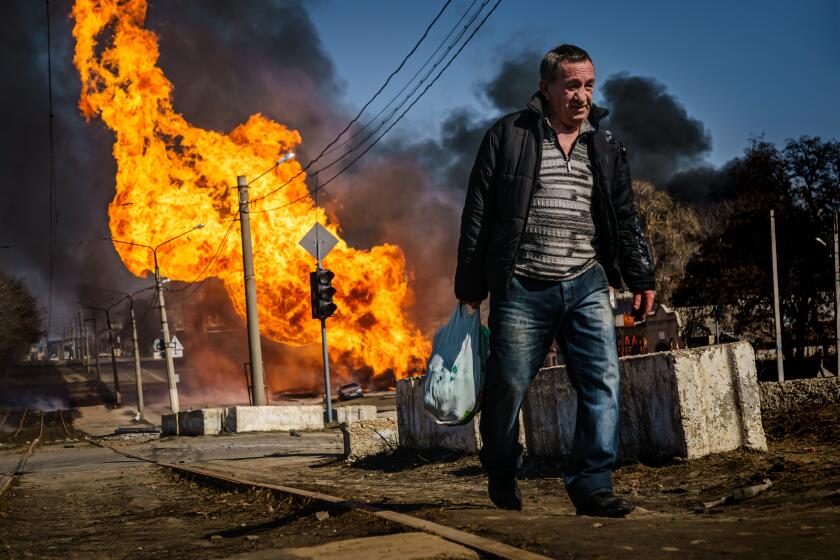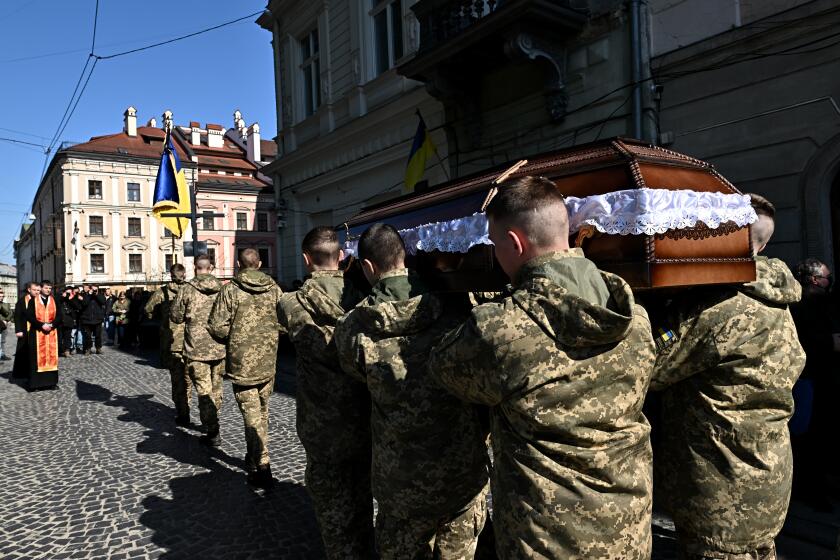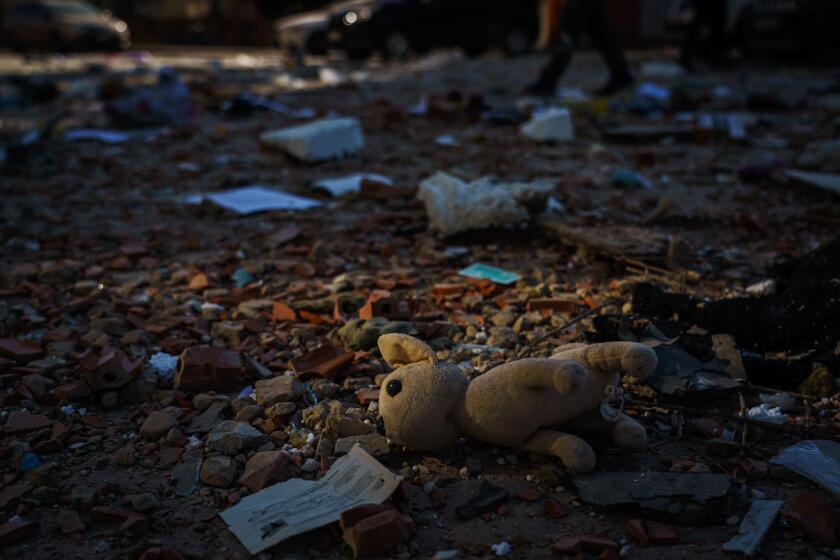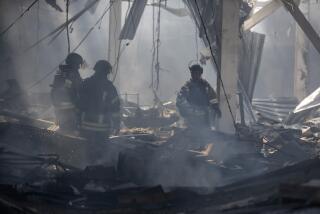Russian attacks intensify in Ukraine; Zelensky again pleads for no-fly zone
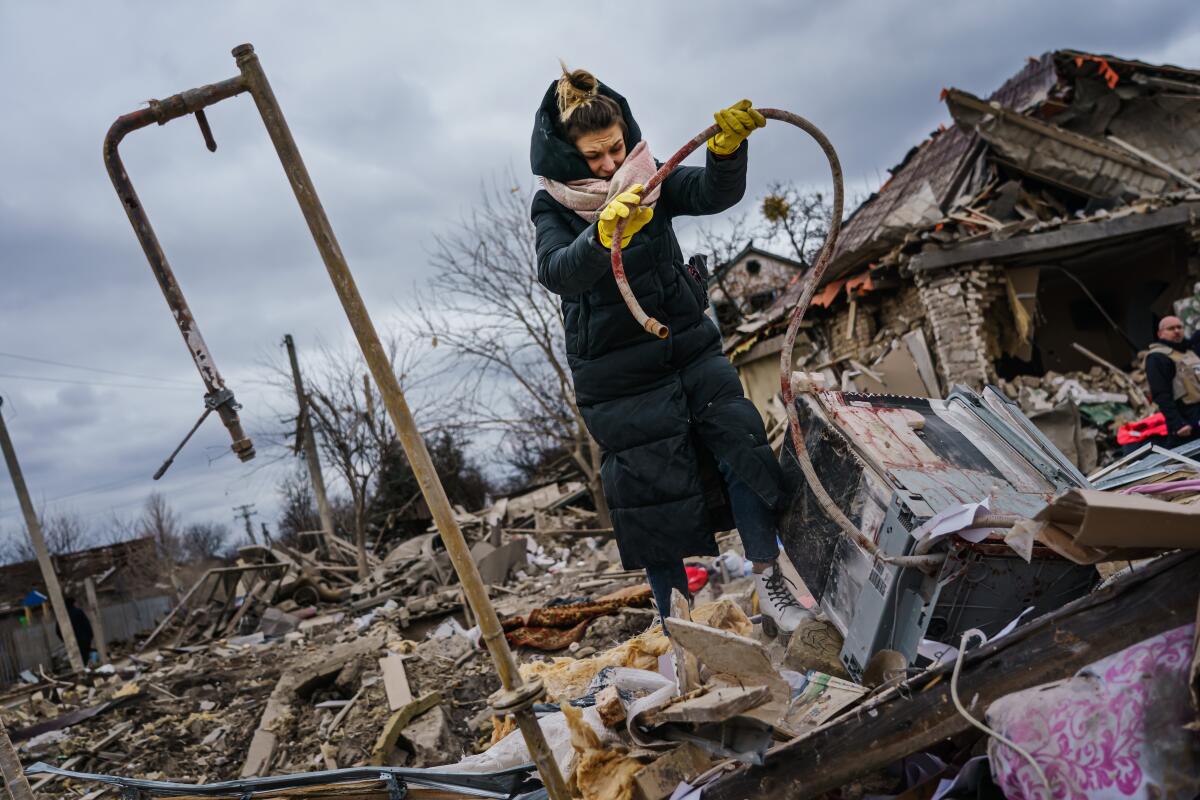
- Share via
KYIV, Ukraine — With Russian troops besieging cities in Ukraine’s south, spurring a humanitarian catastrophe even as they press their offensive around the capital, Ukrainian President Volodymyr Zelensky warned Sunday that the strategic coastal city of Odesa would soon be under attack and he repeatedly urged Western countries to create a no-fly zone.
“Russians have always visited Odesa, felt only warmth in Odesa.... And now what? Bombs on Odesa? Artillery on Odesa?” Zelensky said in an impassioned video address. “It will be a war crime. It will be a historical crime.”
His pleas came as Ukrainian authorities tried and failed for a second consecutive day to evacuate civilians from Mariupol and Volnovakha, two cities in eastern Ukraine’s Donetsk region. Mariupol, a port city of half a million people, is a key part of Russia’s offensive to deny Ukraine any exit to the sea. An earlier cease-fire on Saturday broke down with both the Ukrainian and Russian sides accusing the other of violations.
Both cities have in recent days suffered cutoffs of electricity, heat and food amid the encirclement by Russian forces who have expanded their reach across the south.
The Times’ Marcus Yam, no stranger to war photography, gives a first-person account from Ukraine.
But the cease-fire didn’t materialize Sunday. Though a “regime of silence,” or cease-fire, was set to begin at 10 a.m. and last for 11 hours, it had collapsed by afternoon. Pavlo Kirilenko, head of the Ukrainian government’s military-civilian administration in Donetsk, said the evacuation convoy couldn’t leave, blaming the situation on Russian troops who he said were “regrouping their forces” and conducting “powerful shelling” of the city.
“It is extremely dangerous to take people out under such conditions,” he said, adding that a humanitarian convoy was heading toward Mariupol from the city of Zaporizhzhia, more than 120 miles away, but had yet to reach its destination.
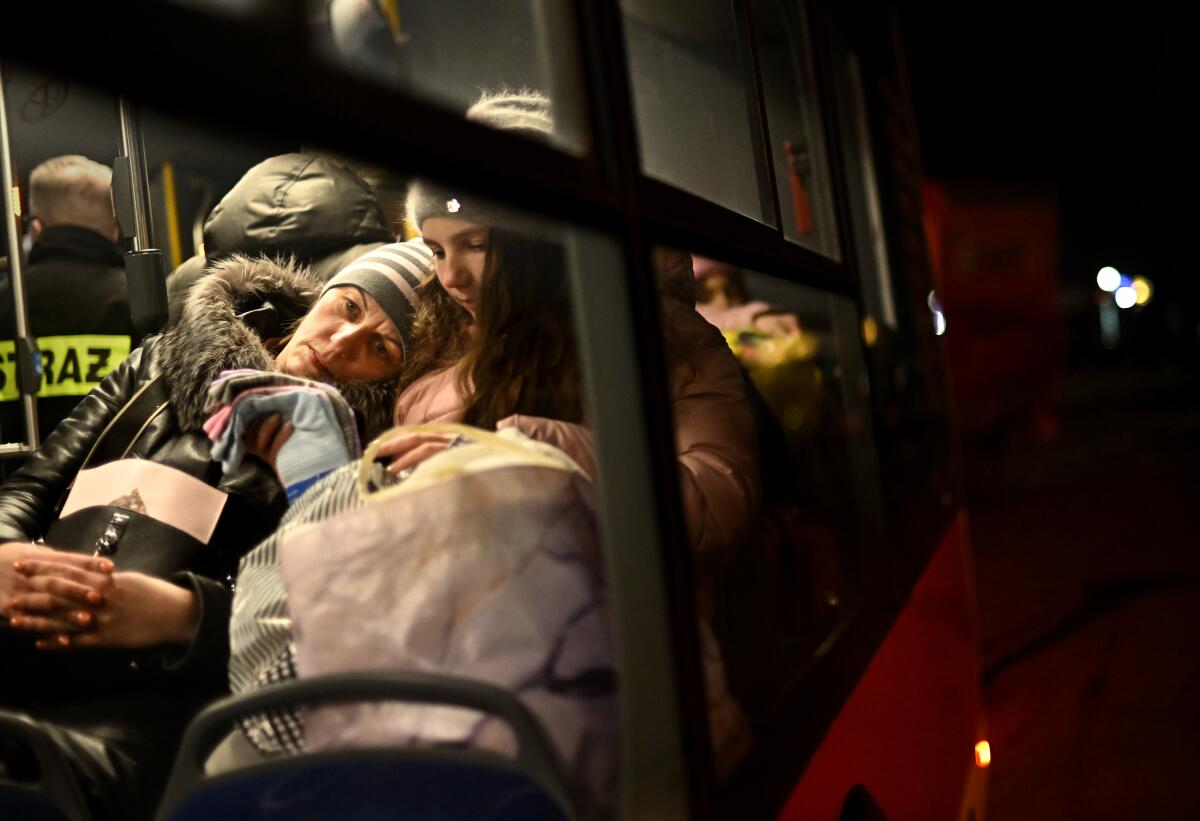
The International Committee of the Red Cross confirmed that the estimated evacuation of some 200,000 people from Mariupol failed, saying the city was enduring “devastating scenes of human suffering.”
“Today, our team began opening up the evacuation route from Mariupol before hostilities resumed,” the group said in a statement. “We remain in Mariupol and are ready to help facilitate further attempts — if the parties reach an agreement.”
Mykolaiv, another coastal city that Russian forces have thus far been unsuccessful in capturing ahead of a push on Odesa, continued its defense. Mayor, Oleksandr Senkevich said in a post on his official Facebook page that the city remained in Ukrainian hands and thanked employees of a local company who helped prepare Czech hedgehogs — the large, caltrops-shaped antitank obstacles.
Almost 800,000 Ukrainians have fled to Poland as Russian forces push farther into Ukraine.
Later in the day, Zelensky posted another video message after reports of an eight-rocket barrage hitting the Vinnytsia regional airport, some 110 miles southwest of Kyiv: “Against our city against our peaceful Vinnytsia — which has never posed a threat to Russia in any way — a brutal, cynical missile strike has completely destroyed the airport.”
He added that Russia was obliterating Ukrainian infrastructure and that it was the responsibility of Western leaders to create a no-fly zone. “If you do not do that, if you don’t at least give us aircraft for us to be able to protect ourselves, there can be only one conclusion: You also want us to be slowly killed. This is also the responsibility of the world’s politicians. Western leaders. Today and Forever.”
The conflict has spurred a mass exodus of Ukrainians fleeing either to the country’s western regions or neighboring nations. On Sunday, the United Nations high commissioner for refugees, Filippo Grandi, said the number of Ukrainians who have crossed the border to the country’s neighbors surpassed 1.5 million.
He characterized it as “the fastest-growing refugee crisis in Europe since World War II.”
With Moscow’s offensive reaching dense urban areas and casualties among civilians spiking, Zelensky exhorted Western powers in another video released earlier Sunday to close the skies over Ukraine and deny the Russians the freedom to operate their aircraft.
Ukrainians have been forced to flee their homes or fight back as Russian forces attack their cities. These photos and maps tell the story.
“The world has the power to close our sky from Russian missiles. From Russian combat aircraft, helicopters,” he said. “If anyone still doubts, Ukraine needs planes. In fact, it’s simple. When you have the will. To make the sky safe. The sky of Ukraine. The sky of Europe.”
But European Union leader Charles Michel, in an interview Sunday, acknowledged that deploying fighter jets to enforce a no-fly zone over Ukraine could be seen by Russia as “NATO’s entry into the war and therefore risk World War III.”
The United States is encouraging military aid to Ukraine through Poland, a member of the North Atlantic Treaty Organization. Poland could supply the Ukrainian resistance with Soviet-era fighter jets, while the United States can “backfill anything that they provide to the Ukrainians” to compensate for any resulting gap in Poland’s security, U.S. Secretary of State Antony J. Blinken said Sunday on CNN.
“We very much support them, providing MIGs, SUs, planes that Ukrainians can fly, to the Ukrainians,” Blinken said.
He added that the United States is toughening sanctions against Russia “virtually every day,” and is considering a ban on Russian oil — a move resisted until now because it could send energy prices surging.
“We are now talking to our European partners and allies to look in a coordinated way at the prospect of banning the import of Russian oil while making sure that there is still an appropriate supply of oil on world markets,” Blinken said.
House Speaker Nancy Pelosi said late Sunday that the House is exploring legislation that would ban Russian oil and energy products from coming into the U.S. In a letter to Democrats, Pelosi said the legislation under consideration would also repeal normal trade relations with Russia and begin the process of denying Russia access to the World Trade Organization.
On Sunday, American Express said it was suspending operations in Russia, a day after Visa and Mastercard made similar announcements. Netflix, the streaming service, said it will do the same. In addition, TikTok, a Chinese-owned firm, announced Sunday that its users will not be able to post new videos in Russia in response to the Kremlin’s crackdown on social media.
The U.N.’s human rights office said 364 civilians have been killed and 759 wounded since the start of the Russian invasion Feb 24. The number, the office said, is likely an undercount.
Ukrainian authorities insist Russian forces are targeting civilians. Videos and witness accounts of airstrikes on cities also offer evidence of such targeting. Moscow denies such attacks, blaming the casualties instead on what it describes as Ukrainian nationalists and neo-Nazis holding civilians hostage.
But civilians are increasingly caught up in the onslaught. Irpin, a town on Kyiv’s northwestern flank close to where a Russian column is bearing down on the capital, had been quiet earlier last week but was the site of fierce clashes Sunday, with Russian and Ukrainian troops trading artillery and mortar attacks throughout the day.
The clashes continued even as evacuees ran to a severed bridge on Irpin’s southern edge before reaching what were supposed to be safer areas on the highway leading to Kyiv. Three members of a family were killed by an incoming mortar round that struck about 100 yards past the bridge. Similar attacks wound into the early afternoon, with mortar rounds smacking houses and kicking up soil even amid the exodus.
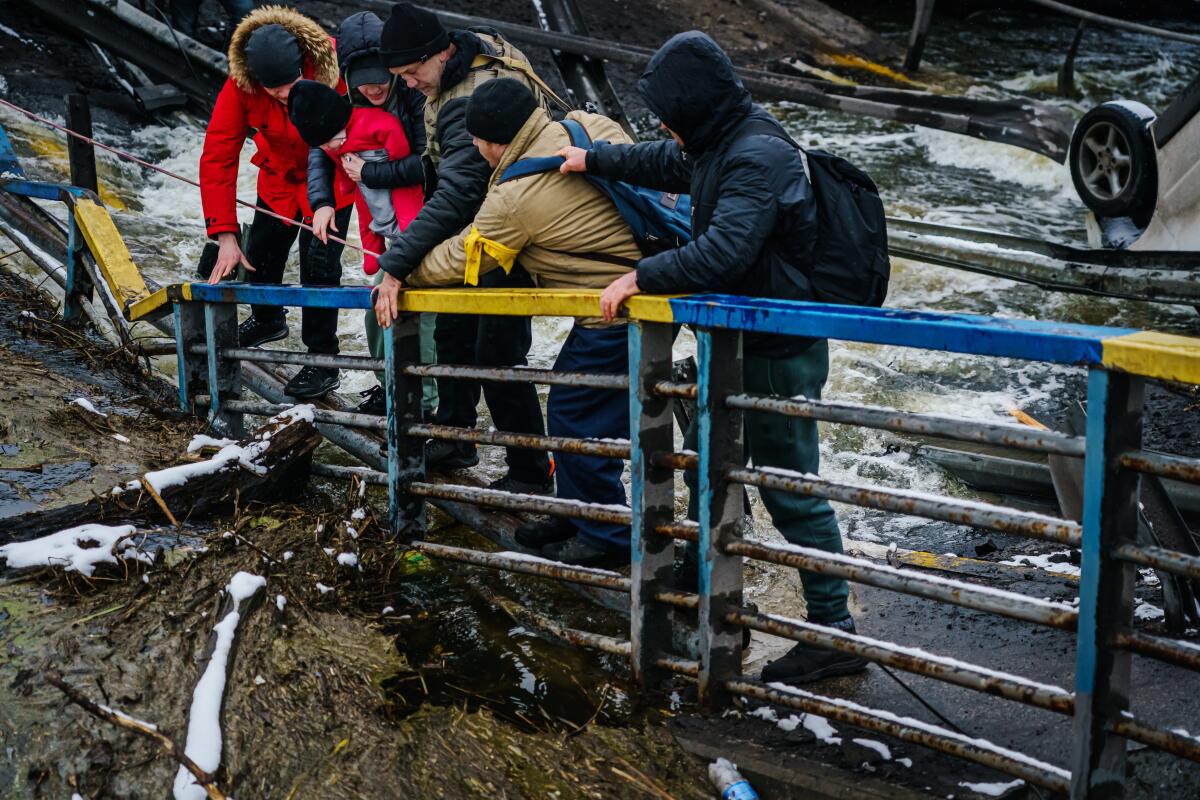
The scene was also turning dire for civilians in Bucha, Irpin’s neighboring town to the north. Bucha’s city council said in a post on Facebook that residents haven’t had electricity, heat or communications for several days, adding that “surviving is a struggle.”
“The enemy continues to fire on houses, cars, killing civilians and even children, looting shops. It is impossible to deliver humanitarian goods: the community is under siege,” the statement said. “Residents are asking to help the sick, those who have not been able to find relatives for several days. A significant number of residents are in basements.”
Meanwhile, tens of thousands have come to the country for its defense. Following Zelensky’s speech last week when he urged those who want to fight Russia to join Ukrainians in an “international legion,” Ukrainian Foreign Minister Dmytro Kuleba said Sunday that the number of volunteers who have signed up was approaching 20,000 people hailing from 52 countries.
That adds to the more than 66,000 Ukrainian men who have returned to join the fight as well, according to Ukrainian Defense Minister Oleksii Reznikov in a tweet on Saturday. The figures could not be independently verified.
Times staff writers Christopher Goffard in Orange County and Tracy Wilkinson in Washington contributed to this report.
More to Read
Sign up for Essential California
The most important California stories and recommendations in your inbox every morning.
You may occasionally receive promotional content from the Los Angeles Times.
